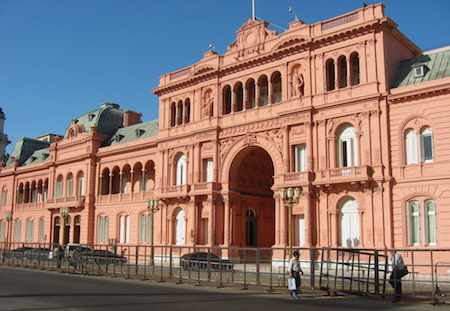
The first week of March has come to an end which means two things: autumn is coming & the school year has begun. Naturally, the education system is not immune to current political & economic problems in Argentina. Faced with less funding for schools & salary cuts, threats of striking teachers in half the provinces of Argentina had many people wondering if classes would be in session or not. Buenos Aires had no problems on the first day of class, but the strike was adhered to in seven other provinces. The following day, news media reported that most teachers in the country reported for work, & the story quickly disappeared from headlines. President Duhalde went to Ushuaia in Tierra del Fuego to inaugurate the school year. Fortunately there were students and teachers present to listen to his public address!
That same day, Economic Minister Remes Lenicov announced a new optional plan for plazo fijos. More confusion for everyone! Stability usually makes people content, even if it’s a decision they don’t agree with & part of Cavallo’s mistake was changing economic policies every few days. That kind of reactionary behavior generates insecurity & lack of faith in the political system. The three new bond options backed by the National Treasury, available until 15 Apr 2002, are as follows:
- Bonex dollar bond #1: 10 year maturity, 2% annual interest with payments biannually. After the second year, funds can be returned in 8 quotas until the expiration of the bond in 2012. The attractive part is that payments will be in dollars.
- Bonex dollar bond #2: 10 year maturity, higher interest based on LIBOR + 1% (currently 3.09%). No payments until 2012, but the final payment will be in dollars. The London Interbank Offered Rate is set by a specific group of London banks for US dollar deposits of a stated maturity & used as a base index for certain adjustable rate investments.
- Bonex peso bond: 5 year maturity, interest of 3% + CER. No payments until expiration of bond in 2007. The current repayment plan of the corralito offers quicker access to funds than this bond. A definition of the CER is included in the glossary section.
Without choosing any of these new bonds, the repayment plan noted under No more dollars will be in effect. The option of purchasing registrable goods (property, car, etc.) also remains. However, few people have the quantity of cash available to purchase property, & no loans are being given at present. Buying a car only generates more expenses. In my opinion, most people have little confidence that the repayment plans described above will actually occur given the history of Argentina’s treasury department.
On returning to the capital Duhalde confronted another crisis, this time from the interior. Milk producers claimed that money they receive from every liter of milk (on average $0.10) was not enough & went on strike. In the city of Córdoba, large protests filled the streets & milk production stopped. Producers gave milk away locally rather than selling it at what they deemed an unfair price. With reserve supplies running low & fear of price increases, an agreement was reached last night with the Province of Buenos Aires. For those producers, the return will be $0.20 per liter & supermarkets decided to make one cent less profit per liter so it could be given to dairy producers. Undoubtedly, these changes will be reflected in dairy prices next week & passed on to the consumer. The strike continues for all other provinces.
Finally, more protests converged on the Plaza de Mayo on Friday as various groups arrived to express their discontent. Metal workers, taxi drivers & those opposed to the corralito created traffic jams on most major streets in Buenos Aires. The heat wave didn’t help cool people’s anger with the heat index reaching over 95º F. Isn’t this supposed to be fall? All of this admist the return of an IMF negotiation team to Argentina. Headed by Indian economist Anoop Singh, up to U$S 9 billion in aid is standing by based on an old agreement under former President De La Rúa. Many outside of the government feel that the IMF is partially responsible for current economic problems & refuse any type of assistance. Regardless of popular sentiment, trust in Argentina’s credit-worthiness will have to be regained after declaring default in December 2001.
This was just one week’s worth of events!! Oh, Shell and Esso/Exxon increased gas prices by about 4%. It never ends…
[Originally posted in Argentina Experienced, a website I created to document living in Buenos Aires after the 2001 economic crisis. Text has been edited for style. Definitions of econ terms can be found in the glossary. Politician biographies may help, as well as a summary of recent history & current events.]